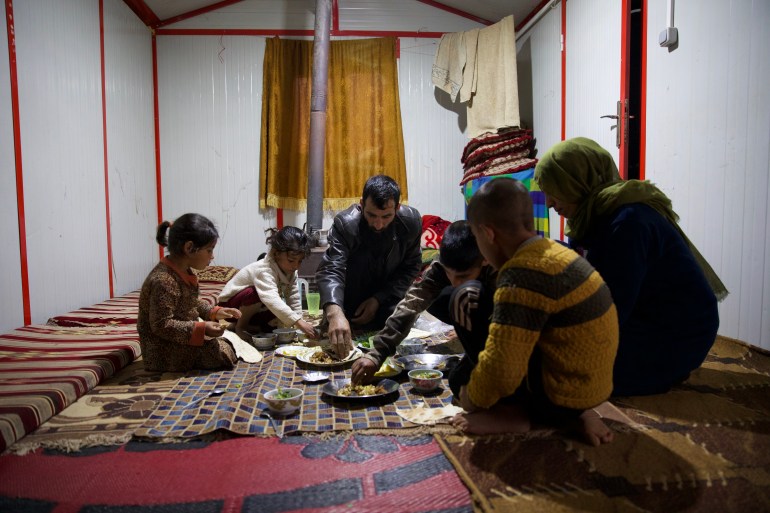The decision was reached a few hours before sundown on the second day of Ramadan, the holy month of fasting for Muslims across the world, and a decision was needed so food could be readied for iftar, the sunset breaking of the fast. Because maqali is a simple dish, true to its name which means “fried things”, Bayan was not too worried about whipping it up in time.
“We all love fried vegetables,” Bayan said, referring to her husband and five children, adding that the vegetables in question that day would be zucchini, eggplant, cauliflower and potatoes, a classic combination.
Her husband, Khaled al-Reem, 45, was dispatched to the market to pick out the required ingredients and bring them home.
Then the couple started working together to prep, with Bayan heading out to the communal water tank to wash the vegetables and then sitting on the floor in the tent with Khaled to peel and chop the vegetables into the sizes they wanted for frying.
Maqali is a simple dish to prepare, as the recipe’s steps are limited to chopping or slicing the vegetables into the preferred size and then deep frying them to the preferred brown, so Bayan had little to worry about in that regard.
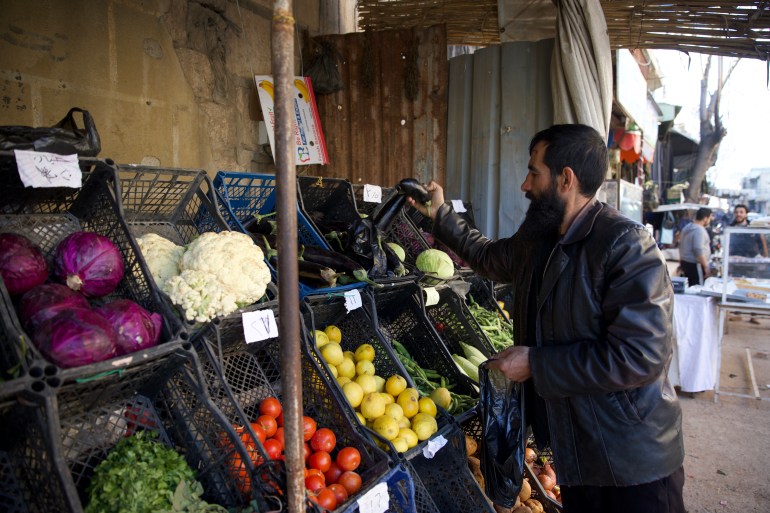
She and Khaled had to make sure that they prepared more potatoes than the other vegetables though, as their eldest son, Hisham, is especially partial to fried potatoes.
What was going to pose a problem though was heating the oil in her battered, blackened cooking pot perched above a delicate fire stoked painstakingly with twigs as sunset approached.
But she managed, and set to frying, with Khaled standing by to help and to ferry plates of finished food back to the tent from the spot where they had set up their makeshift open cooking space.
A little spice, if you have it
Maqali are usually sprinkled with a mix of spices as they emerge hot from the frying oil, things like cumin and hot red pepper flakes may feature in that mix.
They are also served with a range of different sauces, depending on the family’s preference – some favour a tart, rich tahini sauce and others lean towards a pungent garlic sauce with lemon.
But Bayan and her family are so impoverished by the war and their displacement that they do not have the money for sauces – they, like thousands of other internally displaced people (IDPs), had come to the Yaman displacement camp five years ago when they had to flee their home in Khan Sheikhoun.
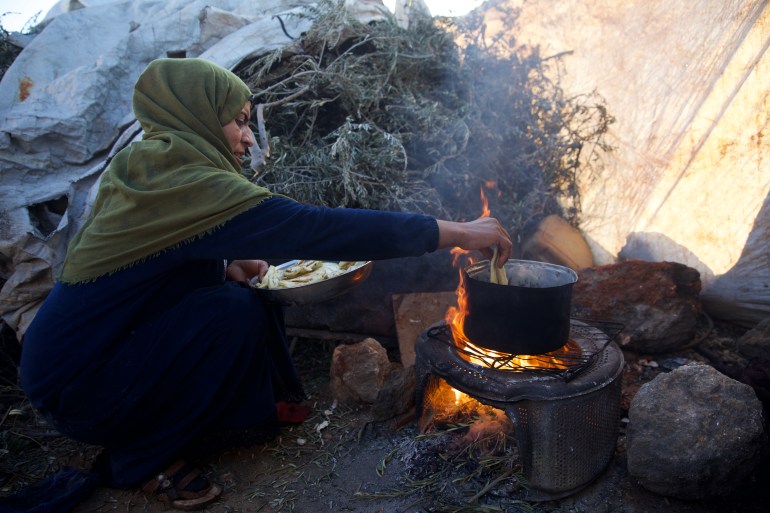
So she chooses to sprinkle the vegetables with salt alone and serve them with a simple chopped salad.
By the end of the 13th year of war in Syria, the World Food Programme estimates that 12.9 million Syrians are suffering from food shortages – more than half of the estimated population of 23.4 million.
And with the continuous rise in food prices, which has more than doubled in the past year, families with the lowest incomes are only able to secure one-fifth of their needs.
To try to make ends meet and secure what they need, Bayan works with her husband and those of their children big enough to work – the eldest is 10 years old and the youngest two – collecting scrap and metal cans to sell.
Memories of Ramadans past
During Ramadan, practising Muslims do not eat, drink, smoke or have sexual relations from sunrise until sunset.
The sunset meal to break the fast takes on a festive air, with many people having gatherings with friends and families or community members, and for that, festive tables are prepared to break the fast.
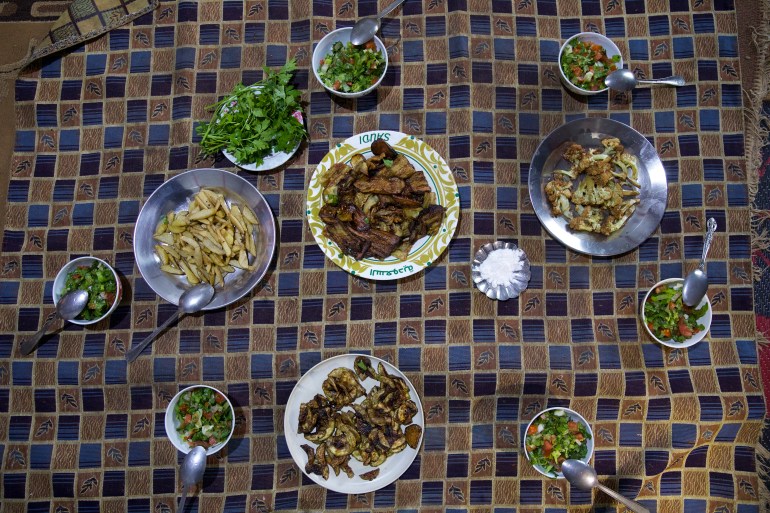
“We used to cook kibbeh and mahshi,” Bayan said sadly, recalling the famous, meat-rich recipes (kibbeh is a combination of fatty spiced ground lamb and a casing made of bulghur and ground meat, while mahshi is stuffed vine leaves cooked over lamb ribs for a rich flavour) that used to adorn the family’s table before the war.
Today, even frying vegetables is a luxury for Syria’s poor families, now 90 percent of Syrians.
“If we can’t buy oil, we can’t fry,” Bayan said. “We’ll usually just eat boiled potatoes.”
It costs a minimum of 250 Turkish lire (about $8) to make maqali, Bayan estimates, while her family’s combined income is 60 to 70 lire ($1.87 to $2.18) a day, so they either have to go into debt to get enough food or adapt by enduring hunger and limiting themselves to one meal a day.
But during Ramadan, Bayan tries everything to give her children whatever special requests they have for the iftar.
“When they ask me for a specific dish, I do what I can to secure it by asking neighbours or others for help,” she said, adding that sometimes she manages it but at other times she has to try to distract them from their cravings instead.
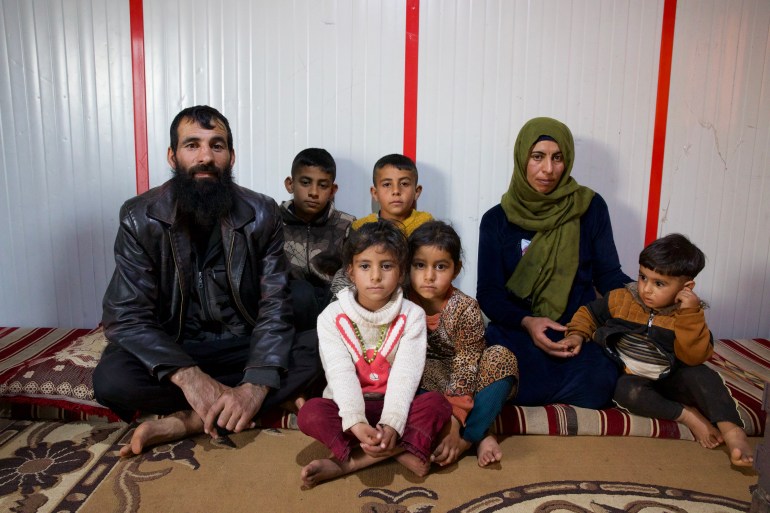
A year ago, the family was receiving about $50 a month in relief support, but the decline in humanitarian funding, which hit 37.8 percent of requirements for the 2023 Humanitarian Response Plan of the United Nations Office for the Coordination of Humanitarian Affairs (OCHA), meant even that small amount had to be stopped.
Regardless of the difficulties they face, along with 16.7 million other Syrians who need aid in 2024 according to UN estimates, they still try to find that special joy that Ramadan brings.
Bayan still remembers simpler times before the war during which her extended family gathered around a table filled with delicious food. “Family gatherings are the best thing about Ramadan,” she said.
Now, the family waits for the call to Maghrib prayers, which signal that they should break their fast.
Bayan, her husband and their children sit on the floor to eat their simple yet delicious meal together, passing around the plates of fried vegetables and salad, wrapping morsels up in the bread they were able to buy that day. It is not much, but at least they are together and they have food to eat, and that brings a smile to their faces.
